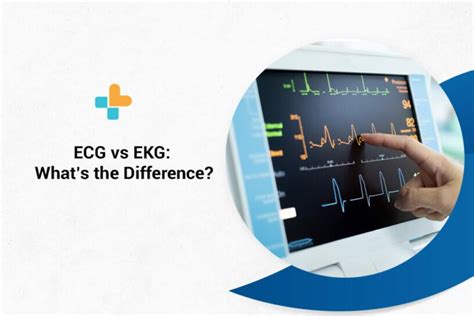The field of healthcare technology has grown exponentially in recent years, and with it, the demand for skilled professionals who can operate and interpret the data from various medical devices. Two such roles that often get confused with each other are Monitor Techs and EKG Techs. While both roles involve working with medical equipment, there are distinct differences between the two. In this article, we will explore the 6 key differences between Monitor Techs and EKG Techs.
Monitoring patients' vital signs and medical equipment is a crucial aspect of healthcare. Monitor Techs play a vital role in ensuring that patients receive the best possible care by closely monitoring their vital signs and alerting medical staff to any changes or concerns. On the other hand, EKG Techs specialize in performing electrocardiograms (EKGs), which are tests that measure the electrical activity of the heart.
Key Difference 1: Job Responsibilities
One of the primary differences between Monitor Techs and EKG Techs is their job responsibilities. Monitor Techs are responsible for monitoring patients' vital signs, such as heart rate, blood pressure, and oxygen saturation, using various medical equipment like cardiac monitors, ventilators, and oxygen saturation monitors. They also alert medical staff to any changes or concerns in a patient's condition.
EKG Techs, on the other hand, specialize in performing EKGs, which involve attaching electrodes to a patient's chest and limbs to measure the electrical activity of the heart. They also prepare patients for EKG tests, explain the procedure, and provide instructions on how to breathe and relax during the test.

Key Difference 2: Education and Training
Another significant difference between Monitor Techs and EKG Techs is their education and training. Monitor Techs typically require a post-secondary certificate or diploma in a healthcare-related field, such as nursing or medical technology. They may also require specialized training in cardiac monitoring and telemetry.
EKG Techs, on the other hand, typically require a post-secondary certificate or diploma in cardiovascular technology or a related field. They may also require specialized training in EKG testing and interpretation.
Education Requirements for Monitor Techs
- Post-secondary certificate or diploma in a healthcare-related field
- Specialized training in cardiac monitoring and telemetry
Education Requirements for EKG Techs
- Post-secondary certificate or diploma in cardiovascular technology or a related field
- Specialized training in EKG testing and interpretation
Key Difference 3: Work Environment
The work environment for Monitor Techs and EKG Techs also differs. Monitor Techs typically work in hospitals, clinics, or other healthcare facilities, where they are responsible for monitoring patients' vital signs and alerting medical staff to any changes or concerns.
EKG Techs, on the other hand, may work in hospitals, clinics, or private medical offices, where they perform EKG tests and prepare patients for testing.

Key Difference 4: Job Outlook
The job outlook for Monitor Techs and EKG Techs also differs. According to the Bureau of Labor Statistics (BLS), employment of cardiovascular technologists, including EKG Techs, is projected to grow 17% from 2020 to 2030, much faster than the average for all occupations.
The BLS does not have specific data on Monitor Techs, but employment of medical and clinical laboratory technologists, which includes Monitor Techs, is projected to grow 7% from 2020 to 2030, which is faster than the average for all occupations.
Job Outlook for EKG Techs
- 17% growth from 2020 to 2030 (much faster than average)
Job Outlook for Monitor Techs
- 7% growth from 2020 to 2030 (faster than average)
Key Difference 5: Salary
The salary for Monitor Techs and EKG Techs also differs. According to the BLS, the median annual salary for cardiovascular technologists, including EKG Techs, was $61,830 in May 2020.
The BLS does not have specific data on Monitor Techs, but the median annual salary for medical and clinical laboratory technologists, which includes Monitor Techs, was $54,180 in May 2020.
Salary for EKG Techs
- Median annual salary: $61,830
Salary for Monitor Techs
- Median annual salary: $54,180
Key Difference 6: Certification
Finally, certification requirements for Monitor Techs and EKG Techs differ. While certification is not always required, it is often preferred by employers.
Monitor Techs may obtain certification from the National Telemetry Association (NTA) or the American Society of Electrocardiography (ASE).
EKG Techs may obtain certification from the National Healthcareer Association (NHA) or the Cardiovascular Credentialing International (CCI).
Certification for Monitor Techs
- National Telemetry Association (NTA)
- American Society of Electrocardiography (ASE)
Certification for EKG Techs
- National Healthcareer Association (NHA)
- Cardiovascular Credentialing International (CCI)



In conclusion, while both Monitor Techs and EKG Techs play critical roles in healthcare, there are distinct differences between the two roles. By understanding these differences, individuals can make informed decisions about their career paths and pursue the role that best aligns with their skills and interests.
We invite you to share your thoughts and experiences in the comments section below. What do you think are the most significant differences between Monitor Techs and EKG Techs? Have you worked in either of these roles? Share your insights and help others understand the key differences between these two critical healthcare roles.
What is the primary responsibility of a Monitor Tech?
+The primary responsibility of a Monitor Tech is to monitor patients' vital signs, such as heart rate, blood pressure, and oxygen saturation, using various medical equipment like cardiac monitors, ventilators, and oxygen saturation monitors.
What is the primary responsibility of an EKG Tech?
+The primary responsibility of an EKG Tech is to perform electrocardiograms (EKGs), which involve attaching electrodes to a patient's chest and limbs to measure the electrical activity of the heart.
What is the job outlook for Monitor Techs?
+According to the Bureau of Labor Statistics (BLS), employment of medical and clinical laboratory technologists, which includes Monitor Techs, is projected to grow 7% from 2020 to 2030, which is faster than the average for all occupations.
